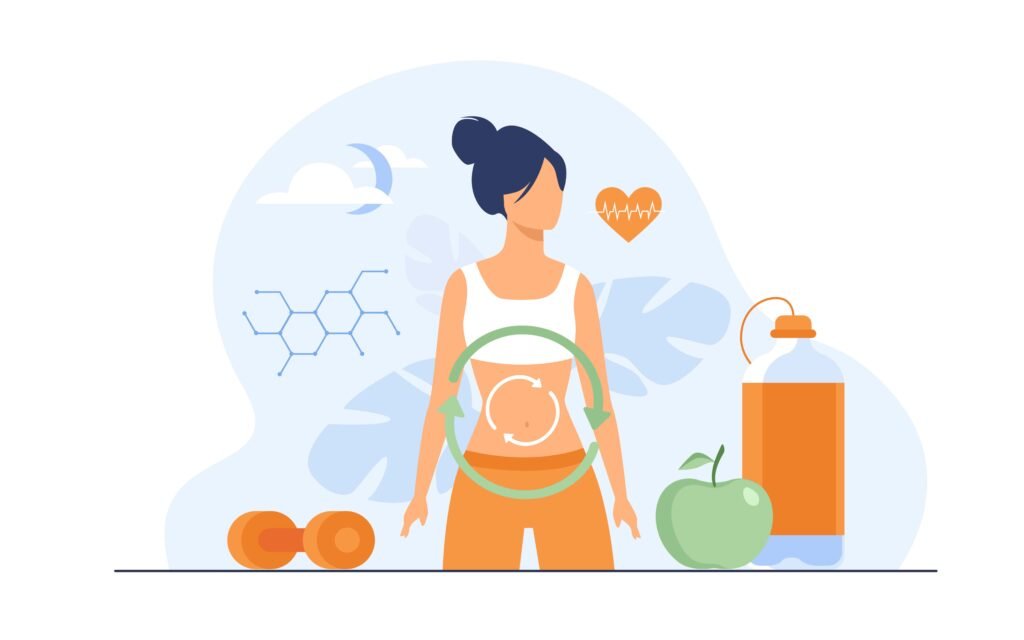Many people associate weight gain with overeating or a lack of exercise because they were not in the mood. Yet the real issue can often be traced to the gut. The digestive system plays a major role in managing hormones, energy levels, and how the body processes nutrients. When it falls out of balance, everything from metabolism to appetite can start working against you.
Poor gut health caused by inflammation, stress, or an unhealthy diet can send the wrong signals to your brain, leading to cravings and slower calorie burning. Over time, this makes it harder to lose fat even when you’re trying your best. Understanding how gut health and weight gain are connected can help you make changes that support both better digestion and sustainable weight management.

Gut health and weight loss are closely linked because a balanced gut helps regulate hunger hormones
How Your Gut Talks To Your Brain
Your gut and your brain are in constant conversation through a pathway called the vagus nerve. It’s like a hotline running between the two. When digestion is smooth and balanced, your gut sends calming signals upstairs, “all clear, we’re good down here.”
But when you’re dealing with reflux, IBS, or even dehydration, those signals change. The gut starts pinging the brain with messages of chronic stress: something’s wrong, stay alert. The brain responds by cranking up cortisol, your main stress hormone.
And when cortisol stays high, your body shifts gears. Instead of burning calories for energy, it starts conserving them. Fat-burning slows down, metabolism drags, and the body goes into storage mode, especially around the belly.
The Late-Night Trap
These gut stressors don’t just mess with your hormones. They often change your behavior in sneaky ways, too.
Take reflux. That burning sensation at night is uncomfortable, so many people grab a snack or a glass of milk before bed just to settle things down. It works for the moment, but it also adds an extra 200-300 calories at the worst possible time of day.
Stack that habit over weeks and months, and you’re looking at 7–10 pounds of weight gain a year. And that’s before accounting for the slowed metabolism caused by cortisol and poor digestion.
The Nervous System On Edge
Here’s what makes hidden stressors tricky: you might not even notice them until they’ve been running in the background for a while.
Every little flare-up, heartburn, bloating, cramping, or dehydration keeps the nervous system slightly on edge. Cortisol creeps up, the stomach lining weakens, digestion slows, and nutrients aren’t absorbed the way they should be.
A Widespread Problem
- Worldwide: Around 14% of people (about 1 billion) deal with gastroesophageal reflux disease (GERD).
- U.S.: Nearly 1 in 5 adults experience reflux regularly.
And that’s just GERD. Millions more live with IBS, gut inflammation, or dehydration, all of which send the same “stress” signals to the brain.
What You Can Do About It
The good news is, these hidden stressors aren’t permanent. Once you calm the gut and ease the nervous system, your body can flip back into balance. Here are some simple, practical ways to start:
- Know Your Triggers: Pay attention to how your body reacts after meals. Foods like fried items, caffeine, alcohol, and late-night snacks often upset digestion and weight gain. Spot your triggers and make small swaps to keep your gut balanced. If you’re unsure where to start, consulting a qualified nutritionist can help you identify foods that support both gut balance and a healthy lifestyle.
- Stay Hydrated: Water helps more than you think. Fatigue or irritability can often be dehydration in disguise. Keep sipping throughout the day to support digestion and metabolism.
- Support Your Gut: A balanced gut improves mood, energy, and metabolism. Eat more fiber, add probiotics like yogurt, and use spices such as ginger or turmeric to keep digestion smooth. Combining better gut care with regular movement or guided personal training can further enhance metabolism and make weight management easier.
- Rethink Your Nights: Finish meals a few hours before bed. Skip late-night snacks and relax with herbal tea, reading, or gentle stretches instead.
- Get Checked: Don’t ignore ongoing gut issues like reflux or IBS. Seeing a doctor early helps restore balance and supports better long-term health.
Why It’s About More Than Weight
Hidden stressors in your body don’t just change how you store fat; they shape how you feel every single day. When your gut is calm and your nervous system isn’t stuck in “fight or flight,” everything feels lighter. You sleep more deeply, your head feels clearer, and your energy is steady instead of spiking and crashing.

Poor gut balance often leads to bloating, cravings, and slower metabolism, making weight loss more difficult.
It’s the difference between constantly battling your body and finally feeling like it’s working with you, not against you.
Not all stress comes from your inbox or your calendar. Sometimes, it comes from inside your body. Gut issues like reflux, IBS, dehydration, or inflammation constantly “ping” your nervous system with distress signals. Over time, that keeps cortisol high, slows metabolism, and makes fat storage more likely, even if you’re not eating more.
And when symptoms drive coping habits, like late-night snacks, the effect compounds, adding pounds year after year.
References & Further Reading
- National Institutes of Health (NIH – PubMed) – Gastroesophageal reflux disease and obesity: pathophysiology and implications for treatment https://pubmed.ncbi.nlm.nih.gov/24603845/
- Cleveland Clinic – GERD (Gastroesophageal Reflux Disease): Symptoms, Causes & Treatment https://my.clevelandclinic.org/health/diseases/14431-gastroesophageal-reflux-disease-gerd
- World Gastroenterology Organization (WGO) – Global perspective on GERD prevalence and impact https://www.worldgastroenterology.org/guidelines/global-guidelines/gastroesophageal-reflux-disease
- Mayo Clinic – Irritable Bowel Syndrome (IBS): Symptoms and Causes https://www.mayoclinic.org/diseases-conditions/irritable-bowel-syndrome/symptoms-causes/syc-20360016
- Frontiers in Psychiatry – The gut-brain axis: interactions between gut microbiota, the vagus nerve, and neuroendocrine system https://www.frontiersin.org/articles/10.3389/fpsyt.2018.00044/full
- Harvard Health Publishing – The gut-brain connection https://www.health.harvard.edu/diseases-and-conditions/the-gut-brain-connection
- National Institute of Diabetes and Digestive and Kidney Diseases (NIDDK) – Definition & Facts of GERD https://www.niddk.nih.gov/health-information/digestive-diseases/acid-reflux-gerd-adults
Was this helpful?
Good job! Please give your positive feedback
How could we improve this post? Please Help us.







No Comments